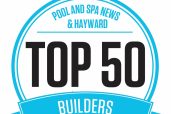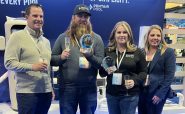I was a cabana boy. As a joke, I say that I rubbed suntan oil for a living.
I worked in a motel in Sunny Isles Beach, Fla., in North Miami Beach, called the Suez Motel. I got the job through a buddy of mine, my next-door neighbor. We rode to junior college together. He got the job there, and then got me a job.
We put out lounge pads and umbrellas everyday. I took care of two swimming pools, and I entertained the guests. We painted the pool every year and cleaned the patio and raked the beach, set up the volleyball net – and drank a lot of beer. I also taught SCUBA diving. I wasn’t an accredited instructor but I did have my Professional Association of Diving Instructors certification. I was teaching guests the basics: how to go upside down in a pool and put a tank on, lay around and watch the bubbles go up, take their mask off and put it back on and clear it.
At night we played guitar and helped out at the hot dog roast they had every week, and we performed other tasks for the guests.
I used to wear a nylon bathing suit and buffalo sandals — do you know what those are? They have a round leather ring around your big toe, and then a little band between the big toe, going back to another band on it. Then I had a nylon jacket that said, “Suez Motel” on the back and it had my name in front.
I worked seven days a week, and I lived across the street from the motel in a brand-new penthouse.
Quick impressions
It as a fun job. Working with people was important — we had to make customers happy.
I wouldn’t call the Suez a high-end place. It was pretty laid-back. It’s just that all motels and hotels had cabana boys. But there were customers who, today, I would have expected to stay at high-end hotels, like the heirs of Fruehauf trailers. Most of the clients were French Canadian. The hockey team, The Montreal Canadiens, would stay there, including some players who were famous, like Henri Richard and Guy Lafleur. At the time, I had no clue who they were so it didn’t mean anything to me. But I later became a season ticket holder for the Florida Panthers. So I can probably blame the hockey thing on my time at the Suez Motel as well.
I don’t know that I learned that much about pools, except that when you acid-wash a pool in those little nylon bathing suits that we wore, the acid eats holes in the trunks. But I learned several things that affect how I do business.
I think the best part of that job was the introduction it gave me to dealing with people. It was good to see people from all over, of all different nationalities, and to interact with them.
We made tips, so we had to read our customers if we wanted to maximize our income. Everybody had a different idea of how attentive they wanted service to be. Some wanted you to be there every few minutes: “Is everything going okay? Do you want some more suntan oil? Should I move the umbrella?” Others didn’t want to see you that often. Some had no use for the lowly cabana boy, while others would talk your ear off and want to take you home with them.
You had to figure out which ones were which so you didn’t say the wrong thing. We had to know where to place the lounge chair on the beach: Is this somebody who wants to sit way out at the end, away from everybody? Or does this guy want to be in a crowd of lively people so they can talk and strike up friendships?
Lasting philosophy
But I also realized that people who came there were on vacation. And you didn’t want to ruin that mindset for them.
That led to one of the important philosophies I’ve followed in my business: When you’re dealing with people who are seeking a fun product like pools, they have visions of fun things. They’re thinking about something positive like looking at their pool and having the family over – unlike if they were buying a new muffler for their car. For pools, customers get fired up. You shouldn’t dampen that or bog it down.
That’s stuck with me, and I’ve always kept it in mind when dealing with clients. They don’t set out to talk about how thick the concrete’s going to be or how many horsepower their pump is – they want to have a good time in the process, as well as with the product itself. I think that’s important, particularly in our field.
At the Suez, I learned the ability to make jokes and communicate openly with people, and I saw the positive effect that could have. I’ve always said if I were looking for an employee, I would take a people person over a technical person, even if the technical person knows a lot more about the product or service. People buy from people, so if they like you, they’re much more likely to give you their business.
Finally, the job gave me my first professional exposure to high-end clientele, which helped me when I became a service technician on Miami Beach. Coming from relatively humble beginnings, now all of a sudden I’m servicing pools in these multi-million dollar homes on the water. That was an awakening, because I’m not sure I knew that existed at that level. But now I was in the backyards of homes on the water with all-tile pools. So that had an impact on my future, first as a service professional, then a designer and builder.




